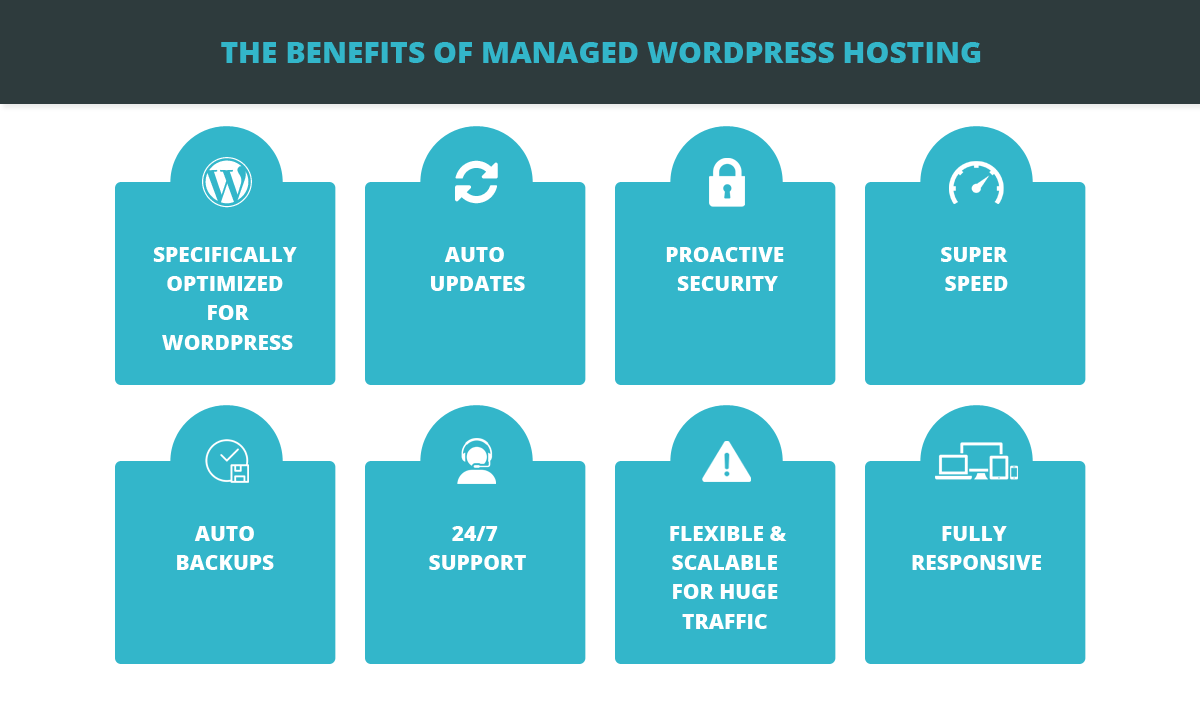When looking for a website hosting provider, there are a few things you’ll want to keep in mind.
Price: Hosting providers offer different plans with different price points. It’s important to find a plan that fits your budget.
Features: Different hosting providers offer different features. Some providers offer more features than others. Be sure to compare the features of each provider to find the one that has the features you need.
Technical Specifications: Each hosting provider has different technical specifications. It’s important to find a provider that has the specifications your professionally designed website needs. For example, if you need a lot of storage space, you’ll want to find a provider that offers a lot of storage space.
It can be difficult to decide which hosting provider is right for you. By considering the three factors listed above, you can make an informed decision and find the best provider for your website.

Types of Website Hosting
-
Shared Hosting
When it comes to hosting your website, shared hosting is one of the most popular and affordable options available. This type of hosting involves sharing server resources with other accounts, making it an ideal option for those who are starting out with their online presence.
Shared hosting is also a great way to keep your costs down, as it is one of the most affordable hosting options available. This makes it a great choice for small businesses and entrepreneurs who are just starting out.
That said, there are some things to consider before choosing shared hosting. Namely, that you may not have access to the same level of resources as you would with a more expensive option like dedicated hosting. Additionally, your site may be slower due to the number of websites on the server.
If you’re looking for a low-cost way to get your website online and aren’t worried about having access to all the bells and whistles, then shared hosting is a great option for you. With shared hosting, your site will share resources with other websites on the server, which can be advantageous in some ways and disadvantageous in others.

Here are some of the pros and cons of shared hosting:
The Pros
a. Cost: Shared hosting is one of the most affordable ways to host a website. In most cases, you can get started for as little as $5 per month. This makes it a great option for small businesses and bloggers on a budget.
b. Easy setup: Shared hosting is typically very easy to set up. Most providers offer user-friendly control panels that allow you to easily add new websites and manage your account settings.
c. Wide selection of plans: Most hosting providers offer a wide selection of shared hosting plans, so you can find one that fits your needs and budget.
d. Good for small sites: Shared hosting is a good option for small websites that don’t require a lot of resources. It’s perfect for beginners or businesses that are just starting out and don’t want to invest in a more expensive hosting plan.
The Cons
a. Limited resources: Because your site is sharing resources with other accounts, it can be slow and unreliable at times. If your website experiences a lot of traffic, you may need to upgrade to a more expensive plan with a better bandwidth allowance.
b. Risk of downtime: If another website on the server experiences downtime, your site will be affected as well. This can be frustrating if your website is down for an extended period of time.
c. Security risks: Because your site is sharing resources with other accounts, it’s also more susceptible to security risks like malware and hacking attacks.
-
Cloud Hosting
Cloud hosting is a type of web hosting that uses a network of computers, instead of a single server, to host your website. This means that your website gets its own dedicated resources and doesn’t have to share them with other sites. This can lead to improved performance and reliability.
Cloud hosting is becoming increasingly popular because it offers a number of benefits over traditional hosting methods. For starters, cloud hosting is incredibly scalable. This means that as your website grows, the resources that are allocated to it will grow as well, ensuring that you never have to worry about your site going down due to lack of resources. Additionally, cloud hosting is very reliable. Because there are so many computers powering your site, the chances of something going wrong are much lower than with traditional hosting methods.

If you’re looking for a hosting solution that offers great performance, reliability, and scalability, then cloud hosting may be the right choice for you.
Advantages of Cloud Hosting:
a. Dedicated Resources – When you’re on a cloud hosting plan, you’re given your own resources that are dedicated to your website. This leads to improved performance and reliability, as you don’t have to share resources with anyone else.
b. Scalability – Cloud hosting is incredibly scalable, meaning that your website can grow (or shrink) as needed without any trouble. If your site experiences a sudden surge in traffic, for example, the cloud can easily accommodate that by giving your site more resources.
c. Cost-effective – Cloud hosting is often more cost-effective than traditional hosting plans, because you only pay for the resources you use. This makes it a great option for businesses that experience sporadic growth or fluctuations in traffic.
Disadvantages of Cloud Hosting:
a. Limited Customization – Unlike traditional hosting plans, cloud hosting doesn’t offer as much customization options. If you need specific software or configurations in order to run your website, you may not be able to find them on a cloud hosting plan.
b. Technical Knowledge Required – In order to use cloud hosting, you’ll need some technical knowledge and experience with web servers and the like. If you’re not comfortable managing your own server environment, cloud hosting may not be for you.
-
VPS Hosting
One of the most popular choices in web hosting is VPS hosting, which is a lot like cloud hosting. The main difference is that your site gets its dedicated resources from a single physical server, rather than “the cloud”. While you don’t get the whole server to yourself, the resources that are allocated to your site are 100% your own (unlike shared hosting).
Despite that, you still will see a good number of hosting providers advertising VPS hosting, so it’s worth knowing about this type of hosting. Here are a few things to consider before making your decision:
VPS hosting is great for small businesses or personal websites that need more resources than what’s available with shared hosting, but don’t need all the bells and whistles of a dedicated server.
One thing to keep in mind is that VPS hosting can be more expensive than shared hosting. However, it’s still a lot cheaper than dedicated hosting.
Another thing to consider is that VPS hosting isn’t as scalable as cloud hosting. If you need to add more resources to your server down the road, it might be difficult or impossible with VPS hosting.
Overall, VPS hosting is a great option for businesses or individuals who need more resources than what’s available with shared hosting, but don’t want or need the full power of a dedicated server.
While traditional VPS hosting used to be quite popular, it’s kind of taken a back seat now that cloud hosting has grown. Most people will be better off with the cloud hosting approach because it offers more flexible scalability. That is, it’s easier to add more resources to your server if needed (or reduce resources). Despite that, you still will see a good number of hosting providers advertising VPS hosting, so it’s worth knowing about this type of hosting.

So what are the pros and cons of VPS hosting? Here are some things to consider:
PRO: You get dedicated resources – This is one of the key benefits of VPS hosting. Since you’re not sharing server resources with anyone else, you can be sure that your site will always run at peak performance.
PRO: It’s more affordable than other types of hosting – VPS hosting is generally more affordable than other types of hosting like dedicated or managed WordPress hosting.
CON: It’s less scalable than cloud hosts – If your site suddenly experiences a surge in traffic, you may not be able to add more resources to your VPS as easily as you could with a cloud host.
-
Managed WordPress Hosting
Managed WordPress hosting is a special type of hosting that’s unique to the WordPress space. You can host a WordPress site on all the other hosting methods, so this is definitely not the only way to host a WordPress site. However, unlike the other hosting types, managed WordPress hosting can only host WordPress sites, which can be limiting in some situations. For example, you couldn’t install your own self-hosted analytics tool (e.g. Matomo) to go along with your WordPress site. It can use different types of hosting environments such as shared hosting, cloud hosting, and so on. In this way, managed WordPress hosting also isn’t entirely separate from the other types of hosting.

What are the benefits of using Managed WordPress Hosting?
There are several benefits to using managed WordPress hosting:
1) Increased Security: Because managed WordPress hosts are specifically optimized for running WordPress sites, they come with increased security features that aren’t available with other types of hosting. This includes features like malware scanning and automatic updates for plugins and themes.
2) Faster Loading Times: One of the main benefits of using a managed WordPress host is that your website will load much faster than if you were using a traditional web host. This is because managed WordPress hosts use caching and minification technologies that aren’t available on other hosts.
3) Automatic Backups: Another benefit of managed WordPress hosts is that they typically offer automatic backups for your website. This means that if something goes wrong (e.g. your site gets hacked), you can restore it quickly and easily from a backup.
4) Support for Multisite: If you want to run multiple websites off of a single installation of WordPress, then you need a host that supports multisite mode. Managed WordPress hosts are one of the few types of hosts that support multisite mode out-of-the-box.
5) Better Scalability: Finally, because managed WordPress hosts are geared towards larger websites, they offer better scalability than other types of hosts. This means that your website will be able to handle more traffic without crashing or slowing down.
How does Managed WordPress Hosting work?
Managed WordPress hosting works by having a specific server setup that is optimized for running WordPress websites. This includes having caching technologies and server software installed that is specifically configured for running WP websites fast and securely. In addition, most managed WP hosts have staff who are specifically trained in how to manage and maintain a WP site – meaning they can help you with things like plugin updates and security issues should they arise.
When it comes to Managed WordPress Hosting, there are definitely some advantages that you should consider:
1. Increased Security – With a Managed WordPress Hosting provider, your site will be more secure than if you were to host it on your own. This is because the hosting provider will have experts who know how to properly secure a WordPress site.
2. Faster Loading Times – A Managed WordPress Hosting provider will also typically ensure that your site loads quickly. This is because they have optimized their servers specifically for WordPress sites.
3. Automatic Updates – One of the best things about Managed WordPress Hosting is that your site will be automatically updated with the latest version of WordPress and any plugins or themes that you are using. This means that you don’t have to worry about keeping your site up-to-date manually.
However, there are also a few disadvantages to consider:
1. Limited Flexibility – If you want to use a plugin or theme that is not compatible with Managed WordPress Hosting, you may not be able to do so. This is because the hosting provider may not allow it or it may not work correctly with their servers.
2. Higher Costs – Managed WordPress Hosting can be more expensive than other hosting types, such as shared hosting or cloud hosting. However, it is often worth the extra cost because of all the benefits that come with it.
-
Colocation Hosting
When it comes to colocation hosting, you really need to know what you’re doing. This is an advanced type of hosting that’s used by only the largest businesses. If you’re not careful, you could wind up spending a lot of money on something that you don’t really need.
So, what is colocation hosting? In a nutshell, it’s when you physically own the hosting hardware. That is, you buy the servers that you want to use. However, you rent space in another company’s data center to have that company power and maintain that hardware for you. This is a great option for businesses that want to keep using their own infrastructure but don’t have the space or resources to maintain it themselves.
Of course, there are some things to consider before jumping into colocation hosting. First and foremost, it can be expensive. You’ll need to pay for the hosting hardware, as well as the rent for space in a data center. And then there are the ongoing costs associated with powering and maintaining that hardware. So make sure you do your research and understand what you’re getting into before signing up.
All in all, colocation hosting can be a great option for businesses that need a lot of horsepowers but don’t want to deal with the hassles of maintaining their own infrastructure. Just make sure you know what you’re doing before diving in head first!

When it comes to colocation hosting, there are definitely a few pros and cons to consider. Here are some of the most important ones:
Advantages:
a. You have complete control over your own hardware – This is a big one, especially for businesses that want maximum flexibility and control over their hosting environment. With colocation hosting, you get to choose the specific servers and equipment that you want to use.
b. You’re not limited by space or location – Unlike with traditional shared hosting, you’re not limited by the amount of space you have or by the location of the data center. This gives you a lot more flexibility when it comes to choosing where your site is hosted.
c. It’s more secure – Because you’re in control of your own hardware, you can be sure that your site is as secure as possible. You also don’t have to worry about other sites on the same server impacting your performance or security.
Disadvantages:
a. It’s more expensive – Colocation hosting can be a bit more expensive than traditional shared hosting, but it’s still much cheaper than buying and maintaining your own infrastructure.
b. It can be difficult to set up – Especially if you’re not familiar with networking and server administration, setting up a colocation hosting environment can be difficult. However, there are plenty of companies that offer colocation services, so you don’t have to go through all the hassle yourself.
Which type of hosting is good for your website?
So, how do you select the right one for your website?
The first step is to decide what your priorities are. Do you need the cheapest hosting possible, or are you more interested in performance and features? If price is your top priority, then you should look for shared hosting or budget VPS plans. If performance is more important to you, then you should consider a higher-priced option like dedicated hosting or a cloud VPS plan.

Another thing to consider is how much experience you have with web hosting. If you’re new to the game, shared hosting or budget VPS plans might be a better fit, since they’re easier to set up and manage than more expensive options. Dedicated and cloud VPS plans require more technical knowledge, so they might not be the best choice if you’re not comfortable dealing with servers and other IT issues.
Finally, think about what kind of website you’re building. If you are looking for a website with an effective design, which needs a lot of disk space or bandwidth, or if you plan on running big applications like WordPress or Magento, then you’ll need a host that can accommodate those needs. Shared hosts might not be able to handle that kind of traffic, so you’ll need to look for a host with higher specs.
So, how do you select the right website hosting type for your needs? By taking into account your priorities, experience level, and website requirements. Once you know what to look for, it’s easy to find the perfect host for your site.

